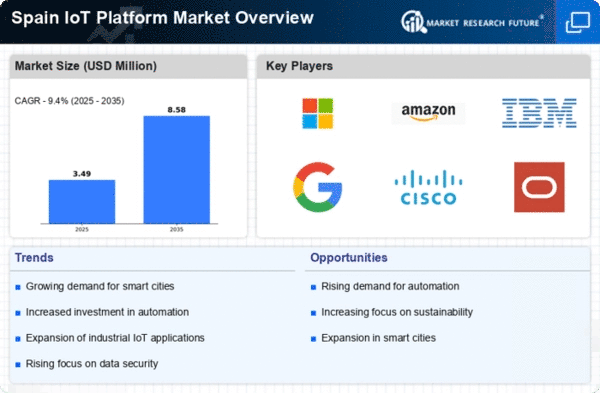Rising Demand for Automation
The increasing demand for automation across various sectors in Spain is driving the growth of the iot platform market. Industries such as manufacturing, logistics, and agriculture are increasingly adopting IoT solutions to enhance operational efficiency and reduce costs. According to recent data, the automation sector in Spain is projected to grow at a CAGR of 15% over the next five years. This trend indicates a strong inclination towards integrating IoT platforms to streamline processes, improve productivity, and facilitate real-time monitoring. As businesses seek to optimize their operations, the iot platform market is likely to experience significant expansion, with more companies investing in IoT technologies to remain competitive.
Growing Focus on Sustainability
the growing emphasis on sustainability and environmental responsibility is influencing the IoT platform market in Spain.. Companies are increasingly adopting IoT solutions to monitor and reduce their carbon footprint, optimize resource usage, and enhance energy efficiency. For example, smart energy management systems powered by IoT platforms are being implemented to track energy consumption and identify areas for improvement. This trend aligns with Spain's commitment to achieving a 20% reduction in greenhouse gas emissions by 2030. As organizations strive to meet sustainability goals, the demand for IoT platforms that facilitate eco-friendly practices is likely to rise, further propelling the market.
Government Initiatives and Support
Government initiatives aimed at promoting digital transformation in Spain are significantly impacting the iot platform market. The Spanish government has launched various programs to encourage the adoption of IoT technologies across different sectors, including smart cities and healthcare. For instance, the National Strategy for Artificial Intelligence emphasizes the importance of IoT in enhancing public services and infrastructure. This support is expected to lead to an increase in investments in IoT platforms, with the market projected to reach €1 billion by 2026. Such initiatives not only foster innovation but also create a conducive environment for the growth of the iot platform market in Spain.
Integration of AI and Machine Learning
the integration of artificial intelligence (AI) and machine learning (ML) into IoT platforms is emerging as a key driver for the IoT platform market in Spain.. Businesses are increasingly recognizing the value of combining IoT data with AI algorithms to derive actionable insights and enhance decision-making processes. This integration allows for predictive maintenance, anomaly detection, and improved operational efficiency. As organizations seek to harness the power of data analytics, the demand for IoT platforms that incorporate AI and ML capabilities is expected to grow. This trend not only enhances the functionality of IoT solutions but also positions the iot platform market for substantial growth in the coming years.
Advancements in Connectivity Technologies
Advancements in connectivity technologies, such as 5G and LPWAN, are playing a crucial role in shaping the iot platform market in Spain. The rollout of 5G networks is expected to enhance the performance and reliability of IoT applications, enabling real-time data transmission and improved device interconnectivity. This technological evolution is likely to attract more businesses to invest in IoT solutions, as they seek to leverage the benefits of faster and more efficient communication. Furthermore, the increasing availability of low-power wide-area networks (LPWAN) is facilitating the deployment of IoT devices in remote areas, thereby expanding the potential user base for the iot platform market.
















